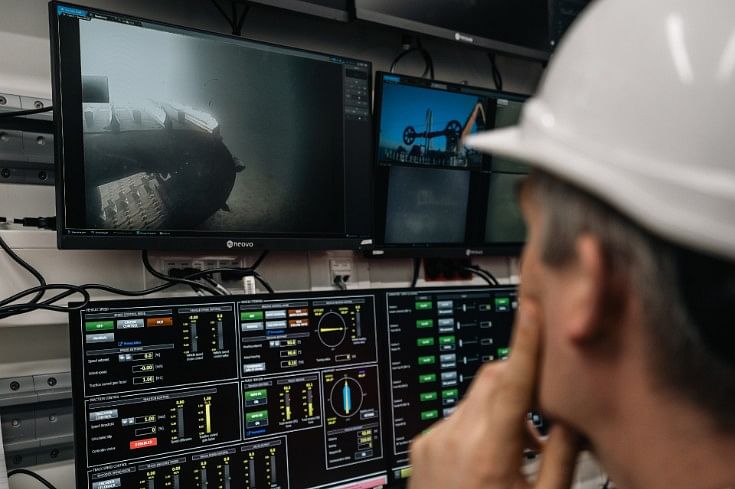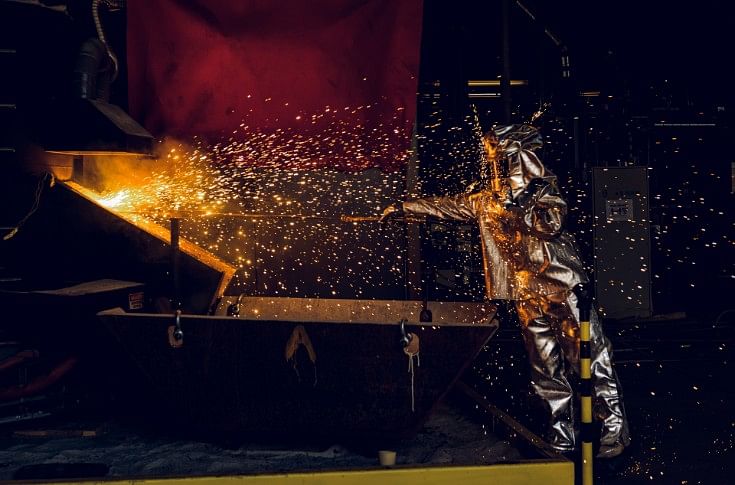Epsilon Carbon, TMC ink pact for green cathodes
Makers of conventional anodes, Epsilon now plans to set up the world’s first nodule processing plant with an investment of Rs 1200 cr in the initial phase.
Epsilon Carbon, which is a leading producer of graphite materials, recently signed an MoU with Nasdaq-listed, The Metals Company (TMC). The pact is primary for conducting a pre-feasibility study for a commercial-scale deep-sea nodule processing plant in India. The ultimate aim is to cut down emission in the production process of lithium-ion batteries using lower-impact battery metals from seafloor polymetallic nodules.
TMC, through its subsidiaries, plans to supply polymetallic nodules and onshore processing expertise while Epsilon Carbon will finance, engineer, permit, build and operate the Project Zero Plant. The targeted production capacity of the plant will be more than 30,000 tonnes per annum (TPA) of the intermediate nickel-copper-cobalt matte product used in nickel-rich cathode chemistries for lithium-ion batteries and Autocar Professional learns that the plan is to scale up production to 10 mtpa. Setting-up and running the plant is expected to cost Rs 1200 crore in the first phase, kickstarting from Q4FY24. Hunt is also on for a third partner who can help with the manufacturing process.

As per Vikram Handa, MD of Epsilon Carbon, the partnership is in sync with the company’s growth plans and the pre-feasibility study being undertaken will help in finalising the ideal location in context of logistic needs including proximity to port, road and railway network. “Our strategy is to expand into cathode materials by 2024. TMC’s polymetallic nodule resource struck us as a game-changing opportunity to tap another unconventional resource with several intrinsic properties that potentially allow us to develop a cathode precursor materials business with a much lower environmental and social impact.” The raw material in the form of polymetallic nodules will be shipped-in through ports and distributed using rail and road networks. "The study is on in this regard," added Handa.
Bringing out the synergies of the partnership, Gerard Barron, Chairman and CEO of TMC in a statement said, "In Epsilon Carbon, we have found a rare mix: a proven operational execution track record in anode materials, a 21st century approach to industrial development grounded in making use of waste products, deep care about safety, environmental and social impacts and an entrepreneurial ambition to develop cathode precursor materials."
Building local expertise, cutting emission
Polymetallic nodules, also called manganese nodules, contain four essential battery metals – cobalt, nickel, copper and manganese, in a single ore. Formed over millions of years by precipitating metals from seawater and sediment pore water, these nodules lie unattached to the seafloor. Using these nodules to create EV batteries is expected to generate, on an average, 90 percent less CO2 emissions than using ores from land-based mines. Just to put this in perspective, a recent MIT study indicated that for every tonne of lithium mined from hardrocks, 15 tonnes of CO2 are emitted into the air.
Apart from the obvious environmental implication, Handa also sees it as an opportunity to make India a key player in the area, “we believe that the scale of TMC’s resource has the potential to turn India into a significant supplier of critical minerals for battery and steel industries.”

Barron too corroborated the view and added that, “Prime Minister Modi’s allocation last year of $600 million for India’s ‘Deep Ocean Mission and the development of a polymetallic nodule collection system shows the country’s commitment to this new, abundant, secure, lower-cost and lower-ESG-impact potential source of critical metals.”
According to Handa, India can take inspiration from neighbouring China, which despite not having all the desired minerals at its disposal, has been able to develop massive processing capacity for conversion of mined minerals into a battery material. "We want to do it in India and to make India self-reliant and also increase local content" noted Handa adding that it will also help in increasing the local contents of Gigafactories, which are mandated to increase their domestic value addition by at least 60 percent within five years to take benefits of sops announced under the production linked incentives (PLI) scheme for advanced chemistry cell (ACC) battery storage.
"Between anode which is about 14 percent and cathode which is about 35-40 percent, we can give a Gigafactories in India about 50 percent local content if they buy these two materials from us," Handa explained, referring to his company's product portfolio which will include anode and cathode – two key elements of battery manufacturing.
Despite the seemingly significant benefits PLI scheme offers to the battery manufacturers, raw material processing companies such as Epsilon Carbon don’t have much to look for in it. Handa pointed out, "Of course this great scheme (PLI) will benefit the Gigafactories but then someone who is putting Rs 1000-2000 crore for raw materials processing is not recognised anywhere."
Other measures suggested by Handa for developing the battery raw material processing industry includes creating a separate industrial park for them instead of clubbing with the EV manufacturing parks. "So raw material processing and cell manufacturing can happen and will be valuable and everybody will like to come there. But that is not happening at the moment and that is what we need to do" he signed off.
The feature was published in Autocar Professional's May 1, 2022 issue.
RELATED ARTICLES
BKT, the ‘Off-Road King,’ Chases the Consumer Market
The company has unveiled a broad range of tyres for the Indian two-wheeler and CV markets.
RSB Group Prepares for Hyper-Growth: New Markets, Tech and Mission ₹10,000 Cr
From a small workshop in Jamshedpur to an engineering group with global reach, RSB Transmissions is preparing for its mo...
Beyond Helmets: NeoKavach Wants to Make Rider Airbags India’s Next Safety Habit
As premium motorcycles proliferate and riding culture evolves, an Indo-French venture is betting that wearable airbags, ...






 04 May 2022
04 May 2022
 6959 Views
6959 Views





 Shahkar Abidi
Shahkar Abidi


 Darshan Nakhwa
Darshan Nakhwa


